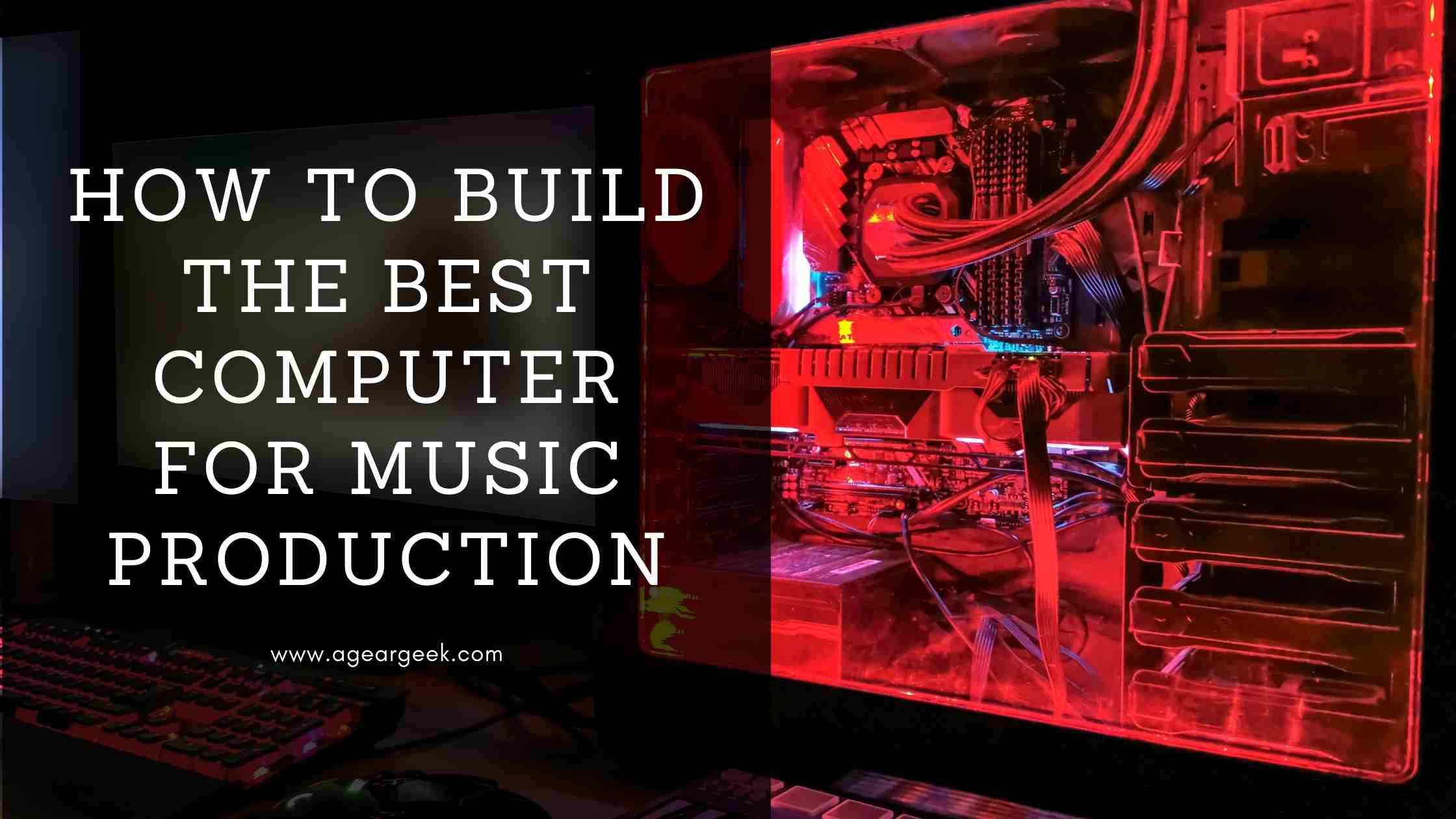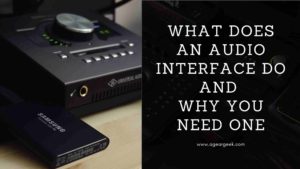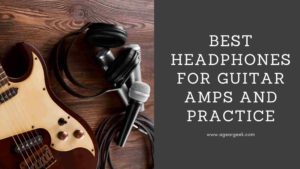If you want to run a home studio, then you will need a good computer for music production. The computer is at the heart of your home studio. The better the computer you have, the smoother the experience and higher the reliability. In this article, we will discuss how to choose the best desktop computer for your music production requirements.
Disclosure: We’re an affiliate. We hope you love the products we recommend! This post contains affiliate links. If you use these links to buy the products, we may earn a commission from the qualified sales. These are at no additional cost to you. Thank you if you use our links, we really appreciate it!
Desktop Computers vs Laptops
With the speed at which the technology space is progressing, things are getting smaller and mightier. So, that means that laptops nowadays have high specs to support music and video production. If you are one of those individuals who are going to be mobile and producing music at a go then laptops are best for you.
But if you are one of those, who have a well-defined home studio and need a robust and reliable system for your recording needs then desktop computers are probably the way to go. Desktop computers have the advantage of housing better and higher-end components. For instance, a desktop computer for music production generally can house a far superior processor than your laptops.
Due to the limited space, ventilation, cooling, etc laptops are at a disadvantage as compared to desktop PCs for housing higher grade processors or higher-end components. Even if you get a laptop with higher features, in all probabilities it will cost you a considerable amount.
Laptops are not upgradable. Most of the components in laptops are soldered to the motherboard resulting in no possibility to upgrade. On the other hand, desktop computers offer infinite possibilities for upgradation. This makes your one-time investment sweat a lot for you as compared to a laptop.
Desktop PCs are no longer boxy looking objects which you prefer to hide below the table. On the contrary, desktop computers are now a style statement with transparent cabinets and glowing lights inside.
Mac vs Windows
This is an ever-ongoing debate and let me try to get this clear at the beginning – it all boils down to personal choices. There are people who are brand loyal, both from the perspective of the PC and the DAW, and prefer to stick with Mac. If you are used to working on Logic Pro then Apple products are the only option for you.
Macs are great systems but they are not cheap. At the price of getting an entry-level Mac, you might be able to build a high-end Windows PC. Some people feel Macs are more reliable as compared to Windows-based PCs but in reality, they might not be. Technology has come a long way and now Windows-based PCs are as good as Macs.
In addition to this, Windows-based desktop computers offer you the flexibility of upgrading in the future which a Mac will not provide. In a nutshell Windows-based desktop computer provide a great value for the money which you invest.
If you still want to go for an Apple product, go for the new 27’ iMac. It offers up to i9 10 core processor with RAM up to 128 GB and large SSD storage up to 8 TB. You can choose your specs and get the one which fits your budget and requirement.
No products found.
Now that we have settled this, let’s dive into the components of a desktop computer for music production that you need to know and consider.
The Case
If you are building a desktop PC, then this is the first thing that you need to consider. There are various strikingly looking models available today. These are so cool that they can give your recording space a very stylish look.
There are primarily three sizes of cabinets – Full Tower, Mid Tower, and mini-ITX. For the purpose of home studios, the Mid Tower cabinets fit the purpose. These cabinets offer enough room to house all system components with coolers and graphics cards and provide a ton of storage options. The other two sizes are either too big or a bit small for our requirements.
When buying a case ensure that it has enough drive bays to house storage drives. The modern cases come with easy assembling functions like thumb screws and snap-on mechanisms which makes life easier assembling. Also, look for cases with cable management to route cables to the rear of the case.
The neatness of the components and the cabling has an effect on the aesthetics. If you are able to make neat placements with good cable management inside and add some RGB lights, choose a case with a side window to proudly display your creation.
Some good options for Mid Tower cases are NZXT H710i, Cooler Master SL600M, and Snowblind Elements.
No products found.
The Processor
The Processor also called the CPU, is the brain of your computer. The better a processor you use, the smoother and more reliable your work will be. Digital Audio Workstations, Plugins, and Effects rely a lot on the Processing Power of the computer to render your work.
A faster CPU means a faster rendering. If the CPU is not powerful enough then it can lead to overloading and crashing of the DAW. This in the middle of your project would mean that you need to start afresh once again.
There are two important features of a CPU – the number of cores and the clock speed. Perhaps a decade back all processors came with a single core. This has changed significantly now with processors of 24 cores available. A Multi-core processor in the simplest of terms means many processors in one processor shell.
When processors used to have a single core, the single-core was responsible for handling all the data for the processor. With multiple cores, the same volume of data gets divided into several cores, improving the efficiency of the processor. This makes these processors faster.
The clock speed is also important and most importantly the base clock speed and not the boost clock speed. For running music software, you need continuous processing power which is supported by the base clock speed. The boost clock speed is of little importance here.
When building a desktop PC, I would recommend going for an 8 core processor and this will be good enough for any DAW needs. But if you feel the complexity of your projects needs higher support, you may consider a higher version. Both Intel and AMD are good choices with perhaps AMD now leading the game. Below are some great options to choose from.
AMD
No products found.
Intel
No products found.
The Motherboard
The Motherboard plays the role of laying the foundation of the PC build. Depending on the processor you have chosen for your build, the next important decision is the motherboard you need to choose.
In the simplest of terms, a Motherboard is a Printed Circuit Board (PCB) that works as a backbone for signal communication in a PC. It connects some very important components to work in harmony. The Processor or CPU, RAM, Graphics Card, Storage, Sound Cards, other connectors, etc. are all connected by the motherboard seamlessly to ultimately work as a single system delivering to your commands.
The choice of Motherboard is dependent on which CPU you choose – Intel or AMD. Depending on your choice of CPU, you will need to have one with a compatible socket and chipset. The socket is the mechanism through which the CPU is connected to the motherboard and the chipset is the motherboard’s software and hardware which works together with the various components enabling communication. The most common form factors of motherboards are ATX and E-ATX.
The other factors which you need to look for are expansion slots which can incorporate your current build and also leaves room for future expansion. The other important factors which you need to consider are support for the amount and speed of the RAM. Supporting storage you want to have, Graphics and connectors for external applications as well as for internal components.
Given below are some recommended motherboards for both AMD and Intel processors.
For AMD
No products found.
For Intel
No products found.
The Memory
In the computer land, memory refers to RAM or Random-Access Memory. This is the memory the computer relies on for information which it needs on an immediate basis. The music production industry works on large sample-based instruments and this requires tremendous RAM support.
While it is possible to work on 8 GB RAM but it is perhaps best to have 16 GB for a smooth experience. 16 GB RAM from this perspective is just the right amount considering it may leave some headroom for other applications. Increasing RAM to 32, 64 or 128 GB can provide a very nice boost to the performance. This also makes your computer for music production reliable for editing more heavy-duty stuff.
The other option is to use RAM with a higher clock speed like 3200 MHz. This will also give a noticeable jump in performance. If you are doing simple at-home productions that do not utilize a large number of applications, this could be a very good alternative to just throwing more RAM to the board.
I generally recommend Corsair when it comes to RAM and its Vengeance LED series is a great offering. With a speed of 3200 MHz its very fast and responsive. The LED vibrant lighting it also adds a class to the build. Corsairs Vengeance LPX RAM is also a great option and very light on the purse. It does not come with a LED option.
No products found.
The Storage
A computer for music production will need a lot of space. There are a few ways this could be addressed. The storage of a computer could be two types – for operating system & program files and project files which could be stored for use on a need basis.
There are primarily two kinds of storage – Solid State Drive (SSD) and Hard Drive (HDD). The Solid-State Drives are like flash memory as you see in USB drives. HDDs are basically a spinning disc in which data is stored. Due to this nature, HDD is slower as compared to an SSD and also consumes more power to operate as compared to SSD. Lastly, HDDs are cheaper as compared to an SSD.
You should understand the speed of the drive has no effect on the speed of the processing of your music by the DAW. It is just that faster storage will help a faster boot of the computer and retrieval of files.
With this background, desktop computers offer a lot of flexibility. You can have an SSD for the computer programs and can have HDDs for storing projects and other files.
No products found.
If you are choosing an HDD, then for purpose of music production it is recommended to choose a 7200 RPM one. Anything lower than this is too slow. There is no limitation to which you can customize this and the amount of space you can allocate for storage.
No products found.
In addition to these, it is also advisable to have an external drive to back up your project files just in case if there is a system crash. Backups can also be done in the cloud as well by paying a very minimal amount.
No products found.
The Power Supply
Normally the power supply does not get enough attention. It is perhaps one of the most important factors which fuels and also protects your system.
The power that comes out of a wall socket is high Voltage 110 – 115 V or 220 – 240 V AC while the power that a computer need is a steady low voltage DC power supply. The primary role of the power supply is to convert the AC power to DC, making it usable for the computer.
The power supply is responsible for powering up all the components inside the computer case like the Motherboard, RAM, CPU, Hard Drives, Disc Drives, etc. It also supplies power via the USB to external devices like an Audio Interface or a USB microphone etc.
If the Power Supply does not provide clean and reliable power, can harm your computer components, the computer can have random resets and freezes, etc. When choosing a power supply, you should base it on the continuous power which the PSU can deliver. The peak power information is of little importance.
Some power supplies come with overvoltage protection and over current protection. In both these cases, a circuit mechanism shuts down the power supply in excessive power which can be harmful to your music production computer. A higher efficiency rating power supply consumes less electricity and also produces less heat. While choosing a PSU, choose one which is certified 80 plus.
Given below are the best options today.
No products found.
Coolers
If you are building a PC for music production and using a high-grade CPU then you will definitely need a cooler. The role of a cooler is to dissipate the heat produced by the CPU so that they are not damaged by overheating.
You can either get an Air Cooler or a Water Cooler. The Air Coolers have specifically designed fins that help to dissipate heat. These are generally fine for regular PCs but when used in hotter setups might not be adequate to cool the components.
Water or Liquid Coolers are more advanced than air coolers and are more effective in cooling. These are generally recommended for heavy duty gaming computer and not for regular ones. These coolers due to having liquids in them are a potential hazard in case of an accidental leakage causing short circuit.
Air coolers are bigger and noisier than water coolers but considering the dangers associated with water coolers, it is recommended to go with an air cooler in case of music production PCs.
Below are some good options.
No products found.
Graphics Card
Graphics card is something which you will not require in music production. This is more applicable to gaming or if you are also using the computer in addition to music production for video editing purposes as well.
Essentially a graphics card allows you to produce images and graphics faster. It comes with its own processor which is called the GPU or Graphical Processing Unit. Just like the motherboard, the GPU is a PCB that houses a processor and RAM. In the simplest of terms, the CPU passes the image information to the GPU which in turns further processes it and sends it to the monitor through a cable.
For lighter use, the GTX1660 holds fort quite nicely. But if you are getting into heavy-duty gaming and video rendering then RX 5700XT or RTX 2070 Super is something you should consider.
No products found.
Summing Up
Building a computer for music production can provide you with infinite potential for customization which a laptop or an iMac will not be able to. This is not difficult and learning and understanding a bit about the different components can help you to build the PC which is ideal for your type of usage.
Buying a stock PC can also give you an edge over a laptop but building part by part offers limitless customization which you can do progressively and save a ton of money. The journey of building a PC is exciting, especially when you are involved in choosing the components.
The PC is only one part of the music production. You will also need other equipment like Audio Interface, Monitors, Microphones, DAW, Headphones, and many accessories. If you are looking to build a home studio, you should check this article. This can help you in your planning and budgeting. Happy building!
Last update on 2025-06-03 / Affiliate links / Images from Amazon Product Advertising API





